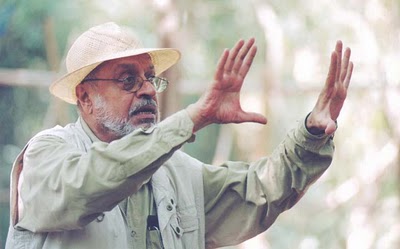| Version 4 (modified by , 12 years ago) (diff) |
|---|
Shyam Benegal (b. 1934)
Hindi director born in Trimulgherry, AP; also worked in Telugu. Made first amateur film aged 12 with father’s camera; nephew of Guru Dutt.
Studied economics at Osmania University, Hyderabad; involved in student theatre. Founded Hyderabad Film Society. Moved to Bombay and worked for Lintas advertising agency (1959-63) and for Advertising & Sales Promotion Co. (1963-73). Made more than 900 advertisements and 11 corporate films (1959- 73). Worked as documentarist; taught at the FTII (1969) and at Bhavan College (1966-73). Received Homi Bhabha fellowship (1969-72), allowing a stay in Britain and in the USA where he worked as associate producer for Boston WGBH TV and with the Children’s Television Workshop in New York. First feature, Ankur, with a 10-year-old script and independently financed, uses a quasi-realist style then considered antagonistic to the Hindi film industry. Its commercial success in the wake of Bhuvan Shome (1969) spawned a new sector of film-making later known as ‘middle cinema’ (cf. New Indian Cinema).
Early work sited in rural environment (Ankur and Nishant in AP, Manthan in Gujarat), using professional actors but with explicit references to the peasant unrest, initially CPI(ML)-led (see Naxalite) and acquiring a national dimension after the failure of the 1971-2 harvests. This work provided an early aesthetic articulation of what would soon become official government media policy towards the rural areas via the SITE programme. Later features are closer to the entertainment-led ‘middle cinema’. Made several features (including fiction) on commission for clients, e.g. the National Dairy Development Board in Gujarat (Manthan), the CPI(M)-led Government of West Bengal (Aarohan), the Handloom Co-operatives (Susman), Indian Railways (Yatra), an Indo- Soviet government-sponsored feature- documentary (Nehru) and the 53-episode TV serial based on Nehru’s book, The Discovery of India (Bharat Ek Khoj). Influential presence in national film policy organisations.
FILMOGRAPHY: 1962: Gher Betha Ganga (Sh); 1967: A Child of the Streets (Doc); Close to Nature (Doc); 1968: Indian Youth: An Exploration (Doc); Sinhasta: Path to Immortality (Doc); Poovanam (Sh); 1969: Flower Garden (Sh); 1970: Quest for a Nation (Doc); Why Export? (Doc); 1971: Pulsating Giant (Doc); Steel: A Whole New Way of Life (Doc); 1972: Tala and Rhythm (Doc); Sruti and Graces in Indian Music (Doc); Raga and Melody (Doc); Notes on the Green Revolution (Doc); Foundations of Progress (Doc); Power to the People (Doc); 1973: Ankur; Suhani Sadak (Doc); 1974: Violence: What Price? Who Pays? (No. 5) (Doc); You Can Prevent Burns (Doc); 1975: Charandas Chor; Nishant; Epilepsy (Doc); Hero (Sh); The Quiet Revolution Pt 1 (Doc); 1976: Manthan; Tomorrow Begins Today (Doc); Bhumika; 1977: Kondura/ Anugraham; 1978: Junoon; 1979: The Quiet Revolution Pt 2 (Doc); Reaching Out to People (Doc); Pashu Palan (Doc); 1980: Kalyug; 1981: New Horizons in Steel (Doc); 1982: Aarohan; Growth for a Golden Future (Doc); 1983: Mandi; Sangathan (Doc); Vardan (Doc); Animal Reproduction and Artificial Insemination in Bovines (Doc); Tata Steel: Seventy Five Years of the Indian Steel Industry (Doc); Nehru (Doc); 1984: Satyajit Ray (Doc); 1985: Trikaal; Festival of India (Doc); 1986: Susman; Yatra (TV); Katha Sagar (TV); 1988: Bharat Ek Khoj (TV); 1990: Nature Symphony (Doc); Abode of Kings: Rajasthan (Doc); A Quilt of Many Cultures: South India (Doc); 1992: Antarnaad; Suraj Ka Satwan Ghoda; 1994: Mammo.
Bhumika starring Smita Patil based on Hansa Wadia
Attachments
-
shyam benegal.jpg
 (20.7 KB) -
added by 13 years ago.
(20.7 KB) -
added by 13 years ago.
